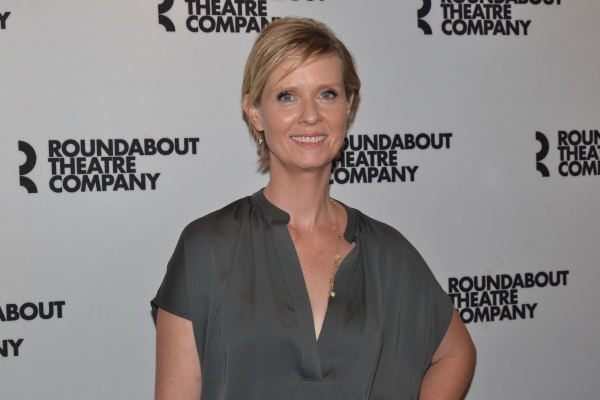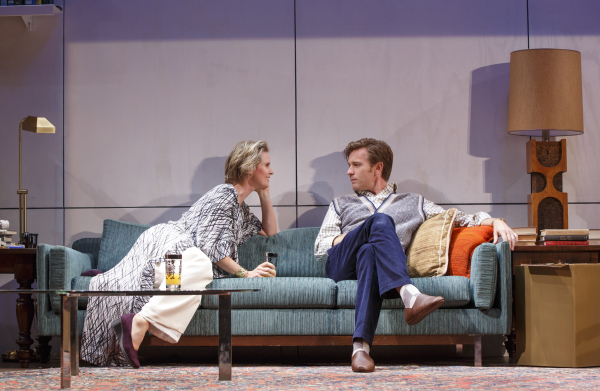Cynthia Nixon Revisits The Real Thing, Three Decades Wiser in the Commitments and Bargains of Love
Emmy, Grammy, and Tony Award winner Cynthia Nixon is just a day away from her second Broadway opening night in Tom Stoppard's The Real Thing. Thirty-one years ago in the play's original Broadway production, the 17-year-old actress' performance was primarily confined to a second-act speech. She played Debbie, the wise-beyond-her-years daughter of the snobbish playwright Henry (a Tony-winning performance by Jeremy Irons) and acerbic actress Charlotte (a Tony-winning performance by Christine Baranski) on whom the challenges and betrayals that often accompany love and marriage have taken their toll. Over three decades, two marriages, and three children later, Nixon is gathering her own experiences in life and love to channel them into her own interpretation of Charlotte — a woman she used to call mother, but now understands far more intimately than she ever anticipated.

(© David Gordon)
Is The Real Thing a show you ever thought you'd be returning to?
No, never! There are other plays that I was in when I was a kid and I thought, When I grow up I'm going to star in "The Philadelphia Story"! But The Real Thing is not one that had ever occurred to me. Also, Christine Baranski, who [played Charlotte] when I was in it initially — now that I'm older I feel like we have more in common than I would have thought — but at the time she just seemed impossibly tall and thin and elegant and I was nothing like that. I was just a kid.
Mike Nichols directed you in the original Broadway production. Is Sam Gold approaching the play differently?
They have certain things in common. They're both very cerebral. They're both very powerful people. But I think their approach is quite different. While Mike is someone who will polish it polish it polish it until it shine shine shines, I think that Sam doesn't want it all polished. He likes a little of the patina left on it. He's constantly digging and I think he resists too much polishing up. I think he thinks some of the authenticity may go out if you set it and then shellac it.
How has your perspective on the play changed since your first experience with it as a teenager?
I was very enamored of the play. I think I was very enchanted with the wordplay and the humor and the puzzle: the play within a play and the way things echo and repeat and how art and life reflect themselves back to each other. But I think that now — being a middle-aged person, being a married person, having children, having children with someone I'm no longer with — all of the four main actors in the play are in the thick of it. We're all married, we're all raising kids, and I just think there is a way in which I understand that it's a very fun play but it's a very mature play. I was sort of enthralled by the sophistication of it as a young person, but I think I couldn't understand the pain of it. When I think about each one of the characters, they're in a lot of pain at one part or another in the play through betrayal or disappointment, but they're all struggling in their own way to do the right thing and to be good to each other.
Is there any particular moment in the play that rings especially true to you now?
Charlotte's speech [where she says], "There are no commitments, only bargains, and they have to be made again everyday." I think maybe when you're younger you can believe in a romantic notion of unconditional love…A love relationship has got to be a two-way street and you've got to keep investing in it and you've got to keep trying to do good by the other person. You've got to make sure you get what you need out of it too because [if someone is] committed but not going to pay any attention to the relationship, the relationship is going to atrophy, like what happened to Henry and Charlotte. He thinks he's completely committed but he's not paying any attention, so it doesn't matter. The ironic thing is the man who's saying "I thought we had a commitment" is actually the one who walked out. You have to fight for what you need. Hopefully out of that will come everybody getting enough of what they want. It shouldn't be like The Gift of the Magi — then I have no hair and you have no watch.
Henry makes the comment that "loving and being loved is unliterary." Is there anyone who you think writes love well?
That's a really hard question. I think what Henry is also talking about is that the fulfillment of romantic love is unliterary, and I completely see his point. It's not very artistic. I love an Emily Brontë or a Jane Austen where there's this love that seems impossible for so long. I think that's much easier and much more exciting as a reader to read about. A love that seems impossible and tragic and doomed.

(© Joan Marcus)










